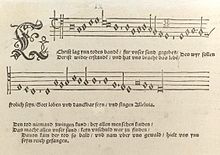Eyn geystlich Gesangk Buchleyn

"Christ lag in Todes Banden", tenor part
|
|
| Editor | Johann Walter |
|---|---|
| Author | Martin Luther and others |
| Language | German |
| Genre | Hymnal for choir |
| Published | 1524 |
Eyn geystlich Gesangk Buchleyn (A sacred song booklet), sometimes called First Wittenberg Hymnal and Chorgesangbuch (Choir hymnal), was the first German hymnal for choir, published in Wittenberg in 1524 by Johann Walter who collaborated with Martin Luther. It contains 32 sacred songs, including 24 by Luther, in settings by Walter for three to five parts with the melody in the tenor. Luther wrote a preface for the part books. The collection has been called the root of all Protestant song music.
Martin Luther used hymns in German to affirm his ideas of reformation and to have the congregation actively take part in church services.Eyn geystlich Gesangk Buchleyn was the third German hymnal, after the "Achtliederbuch", published in Nürnberg by Jobst Gutnecht, and the "Erfurt Enchiridion", published in Erfurt, both also dating from 1524. Eyn geystlich Gesangk Buchleyn was published in Wittenberg and is often referred to as the first Wittenberg hymnal. It came with a foreword by Martin Luther:
That it is good, and pleasing to God, for us to sing spiritual songs is, I think, a truth whereof no Christian can be ignorant. Accordingly, to make a good beginning and to encourage others who can do it better, I have myself, with some others, put together a few hymns, in order to bring into full play the blessed Gospel, which by God’s grace hath again risen. These songs have been set in four parts, for no other reason than because I wished to provide our young people (who both will and ought to be instructed in music and other sciences) with something by which they might rid themselves of amorous and carnal songs, and so apply themselves to what is good with pleasure, as becometh the young.
... auf daß dadurch Gottes Wort und christliche Lehre auf allerlei Weise getrieben und geübt werden. Demnach habe ich auch samt etlichen andern zum guten Anfang und Ursach zu geben denen, die es besser vermögen, etliche geistliche Lieder zusammenbracht, das heilige Evangelion, so itzt von Gottes Gnaden wieder aufgangen ist, zu treiben und in Schwang zu bringen ... Auch daß ich nicht der Meinung bin, daß durchs Evangelion sollten alle Künste zu Boden geschlagen werden, sondern ich wollt alle Künste, sonderlich die musica, gerne sehen im Dienst des, der sie geben und geschaffen hat.
...
Wikipedia
